YIDDISH TANGO FROM WARSAW
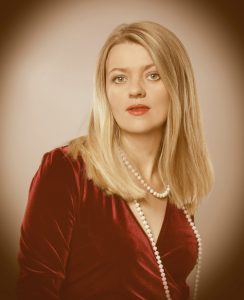 As the tango craze swept through Eastern Europe, pre-war Warsaw bore witness to the birth of the dance form’s most eclectic permutation—Yiddish Tango. A testament to the growing tide of internationalism, Yiddish Tango melds the traditions of Slavic, Jewish, and Argentine culture. The roots of Yiddish Tango, however, lie in the creative exchange that took place in the theaters, cabarets, and cinemas of Poland. Musicians, songwriters, and composers steeped in both the classical and klezmer traditions found liberty in the expression of popular Polish music.
As the tango craze swept through Eastern Europe, pre-war Warsaw bore witness to the birth of the dance form’s most eclectic permutation—Yiddish Tango. A testament to the growing tide of internationalism, Yiddish Tango melds the traditions of Slavic, Jewish, and Argentine culture. The roots of Yiddish Tango, however, lie in the creative exchange that took place in the theaters, cabarets, and cinemas of Poland. Musicians, songwriters, and composers steeped in both the classical and klezmer traditions found liberty in the expression of popular Polish music.
Singing popular Polish songs half in Yiddish and half in Polish became common in those days. It was upon her discovery of one such song, Białostocki’s Rebecca, that Olga Avigail first embarked upon her journey towards Yiddish Tango. She writes, “ . . . I was fascinated by how the music reflects the complexity of Polish-Jewish coexistence.”
The tango “Rebecca,” which uses Hasidic motifs, is among the most beloved and frequently recorded prewar songs still known by every Pole today. It’s a story of Rebeka, a young Jewish woman from the shtetl, who owns a tobacco shop. She’s falling in love with a Polish nobleman from a big city. She imagines marrying him, but he goes away and later returns with a Polish fiancé.
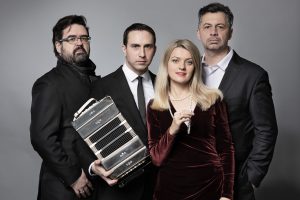
The Yiddish version of this song presents a different perspective; modest Rivkeleh rejects the marriage proposal of a wealthy Polish aristocrat in order to stay loyal to her family and religion. The Yiddish version of the famous “Rebecca” was likely recorded by Tadeusz Faliszewski, but the record didn’t survive, only the photo of the cover.
Olga decided to make the first record of this song since World War II, and that is how the Yiddish Tango from Warsaw project was born.
The multilingual repertoire of this project includes songs in Polish, Yiddish and Hebrew, encompassing along with tango such popular styles of pre-war Warsaw as foxtrot, waltz and songs alla orientale (reflecting the European image of the Orient).
For more information and inquiries, please contact Igor@momentumartists.com.
Press Quotes
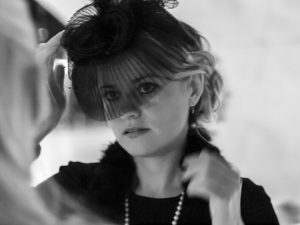 Program highlights include:
Program highlights include:
- Foxtrot “Abduł Bey” or so-called Yiddish fox “Abram ja ci zagram” (Abram I will play for you) written by J. Tuwim
- Popular “Shpil ze mir a tangele” in Yiddish by H. Kohn
- Forgotten “Heyliker Mame” by H. Fenigstein
- Beautiful tango “Yosl un Sore-Dvoshe” written for the Yiddish Theatre by Fajga Jofe (Fanny Gordon), the only woman among the composers of the interwar period
- Famous tango ballad “Bal u starego Joska,” also by Faiga, which evokes an authentic place – a Warsaw tavern run by Józef Ładowski, nicknamed “Fat Josl,” which was a popular hangout for Jews both rich and poor
- Polish tango hits were translated by Gustav Biderman and sung in Hebrew by popular Jewish singer Adam Aston under the name Ben Levi. Olga Avigail’s repertoire includes “Play Fiddler Play,” a popular tango in Hebrew
- One of the most touching songs is the lullaby tango “Mach Tsu Di Eyegelekh” (Close Your Little Eyes), written in 1941 in the Łódź ghetto by Shaja Shpigel after the death of his young daughter. Dawid Baygelman, who wrote the music, died in Auschwitz
- Olga and her band revived another forgotten tango of Baygelman “Grzech” (Sin), which was performed by legendary singer of the Warsaw ghetto Wiera Gran
Olga Avigail’s repertoire strikes a fine balance between music for dancing and for contemplation. New arrangements of Yiddish tango with traditional Argentinian bandoneon organically merge modern sound and the unique style of pre-war tango which veered away from the original Argentinian form and adopted a softer and more lyrical sound, clearly influenced by klezmer.
“Most of the artists, who invented a world-class, high-quality tango music in Poland, perished in the Holocaust. I have a mission to keep their legacy alive,” – said Mieleszczuk.
Olga Avigail
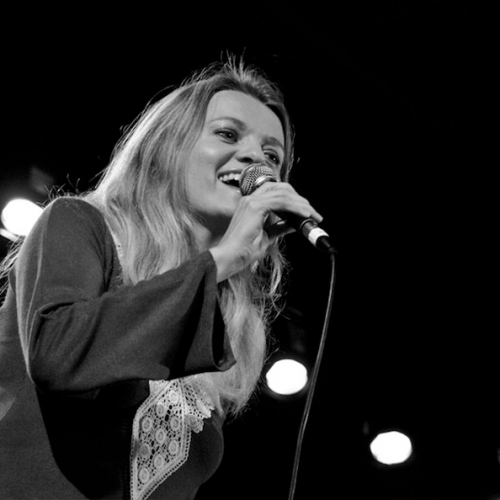
Olga Avigail is a singer, accordion player and researcher of Eastern European musical folklore. Olga is educated in classical music and graduated with a master’s degree in Cultural Anthropology (Warsaw University).
Born in Warsaw, she divides her time between her hometown and Jerusalem, where she currently resides. She initiates Polish-Israeli music projects and collaborates with organizations promoting Jewish culture in those two countries.
Since the very beginning of her creative work, she has been focusing on Jewish music of Ashkenazi roots, especially from borderlands of Poland (Galitzia, Polesye). She has studied Chassidic music, folk Yiddish songs, multilingual Jewish songs, participated in a two-year seminar for Yiddish songs at the Yiddish Theatre in Warsaw and is studying Yiddish at the Yung Yiddish Center in Tel Aviv. Olga has been also studying traditional singing techniques of Slavic music (such as Ukrainian “white voice”).
In 2013 with a group of musicians she initiated the project “Jewish Polesye” which resulted in her debut album. Olga was inspired by the eclectic set of musical material from the repertoire of the 1930’s era Jewish folk singer, Mariam Nirenberg. Nirenberg comes from Polesye, which used to be a borderland of cultures and languages, one of the wildest regions in Europe. The project evokes the lost world of the multicultural Polesye, where Yiddish interwind with Ukrainian and Polish. Its premiere took place at Lincoln Center in New York. It was successfully presented at various festivals of Jewish music and culture all around the world (USA, Canada, Israel, Poland).
Olga then turned to urban music. “Li-La-Lo” is the name of the second album and at the same time a musical cabaret, set up in Tel Aviv in 1944 by a pianist and composer Moshe Wileński and poet Natan Alterman who emigrated to Palestine from Warsaw. Based on works of pre-war Warsaw cabarets, Li-La-Lo achieved great success. Olga with her musicians began performing tango and other songs which were popular in Warsaw and Jerusalem in the 1940s.
“Yiddish Tango” is the latest project by Olga Avigail Mieleszczuk. In 2017 the artist invited leading Polish tango musicians – Tango Attack – to create new arrangements of the pre-war Warsaw tangos. The vast majority of songs were composed by Polish Jews and its uniqueness came from the combination of Slavic and Jewish elements mixed with Argentinian musical influences. Tango hits were written in Polish and Yiddish.
“Yiddish Tango” was performed in prestigious venues in Israel to Poland. Olga’s concerts often feature special guest singers and musicians, such as legendary singer Sława Przybylska, famous singer from Israel Alexander Fisz, and leading Israeli musicians including clarinet player Ittai Binnun and acclaimed jazz pianist from Toronto Ron Davis.
Tango Attack
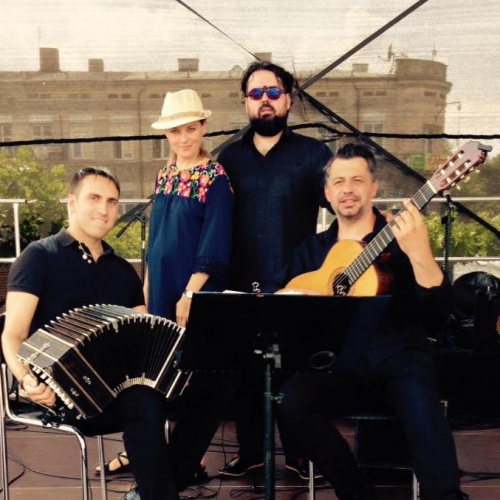
The modern tango band draws the inspiration from both the world’s traditional and avant-garde Argentine tango. The band skillfully explores and adopts all musical trends associated with tango. Their repertoire includes classical tango in new arrangements, tango covers of popular songs and original composition.
The group, formed in 2015, performs regularly with orchestras from all over Poland, including AUKSO Chamber Orchestra of the City of Tychy, Elblag Chamber Orchestra, NFM Orchestra in Wrocław, Chamber Orchestra in Nowy Sącz, Sinfonietta Cracovia and Silesian Chamber Orchestra, performing symphonic and chamber concerts.
Grzegorz Bożewicz: bandoneon and accordion
Piotr Malicki: acoustic and electric guitars
Hadrian Filip Tabęcki: piano and music arrangements
Hadrian Tabęcki: Piano
Hadrian is a composer, arranger, and pianist from Warsaw. He has composed music for films (“Lejdis” dir. by Tomasz Konecki, among others), theatre plays (for Yidishpil Tel Aviv and the Jewish Theatre in Warsaw, etc.). He composes music to poems and texts by Wojciech Młynarski, Wisława Szymborska, Jan Twardowski and others.
He is the author of the “Cantata – Song of the World” oratorio with the lyrics from the Old Testament. As a pianist, he is a member of the Tangata Quintet ensemble which specializes in musical interpretations of Argentine tango. He has numerous recordings for radio and television to his credit and has won many awards for his artistic output.
Grzegorz Bożewicz: Bandoneon
One of the few bandoneon virtuosos in Poland, also an accordionist, pianist, composer, and teacher. Talented and versatile artist, co-founder and member of numerous projects: Barrio Loco, Tangodirection, and Olympos, among many others. Much appreciated interpreter of Argentine, Greek, Irish, French, as well as Baroque and contemporary music genres. He graduated from the Fryderyk Chopin University of Music.
He performs solo concerts, playing mainly chamber music, but also accompanied by orchestras and choirs on various stages, including the Opera House and Philharmonic Hall of Podlasie, the Witold Lutosławski Concert Studio of Polish Radio and the National Philharmonic in Warsaw.
Piotr Malicki: Guitar
Piotr plays classical and electric guitar. He collaborates with various musicians and plays mainly in chamber ensembles, performing stylistically diverse music. Several years ago, he fell in love with tango. That music, imbued with a certain attitude, a certain state of mind, became his lifestyle and his way of thinking. As a member of the Tangata Quintet, he has recorded the album entitled “Tango – my love”.
Discography
Olga Avigail
2017 – “Yiddish Tango Live in Jerusalem“
2015 – “Li-La-Lo“
2013 – “Jewish Songs from Polesye“
Tango Attack
2018 – “Tango Attack Live in Cieszyn”
2017 – “Yiddish Tango Live in Jerusalem”
Contact Us
For all inquiries, please email us at Igor@momentumartists.com, or use the contact form below.


